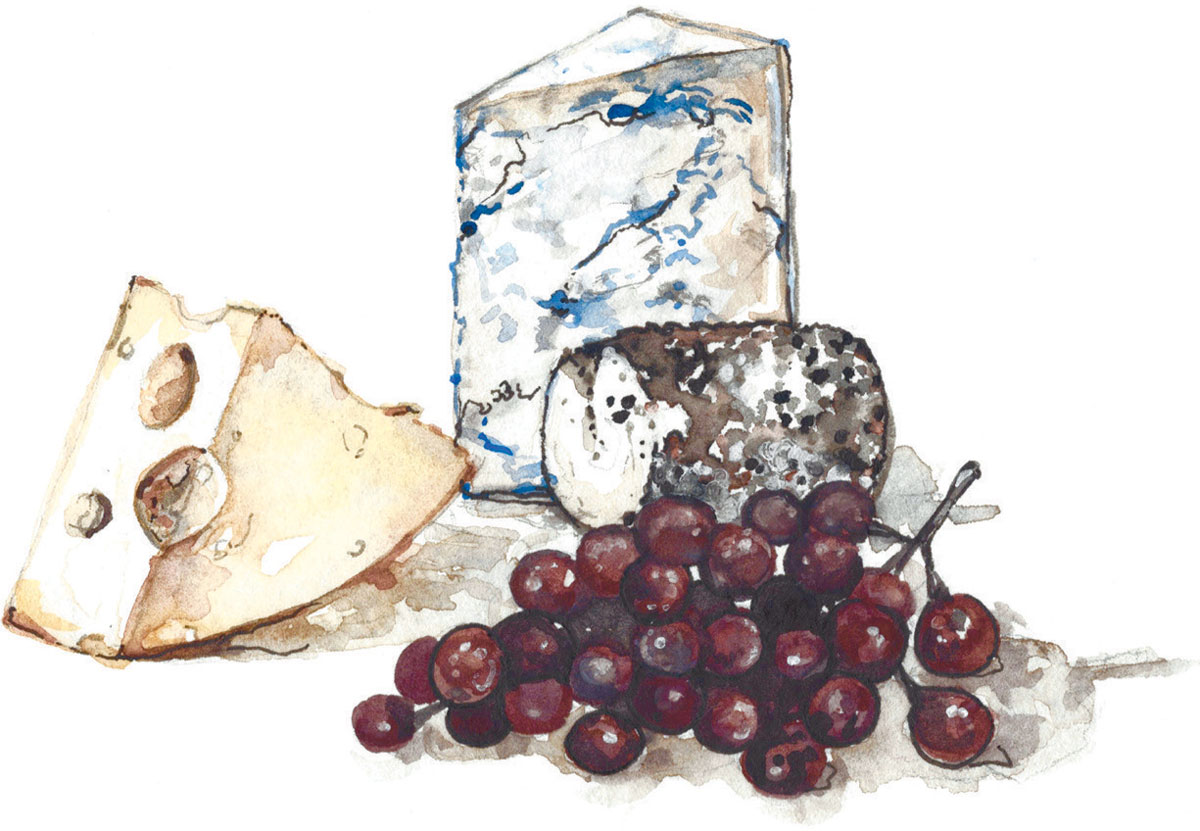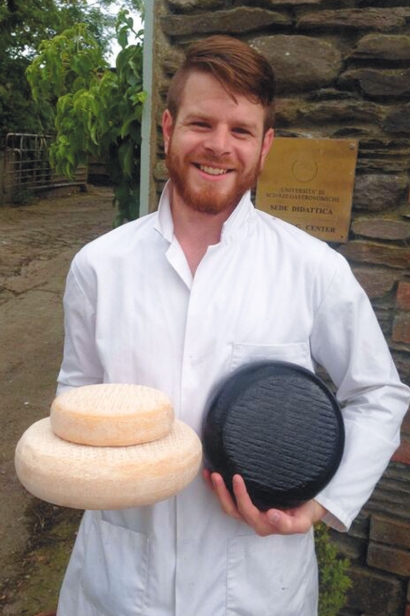The Education of a Cheesemaker
Brian Schlatter’s journey from Ohio to Ireland to become a better cheesemaker
Processed cheese is an abomination. But the process of making cheese—that’s a different story, one that takes a lifetime to tell.
Just ask 29-year-old Brian Schlatter, cheesemaker in training. Born and raised in Defiance, Ohio, he was the sixth generation on his parents’ dairy farm, involved in 4-H and FFA (Future Farmers of America) from the third grade. He became intrigued by cheesemaking as a teenager and sought out a beginner’s book on the subject.
“It was a mix of enjoying cooking and science and watching things change,” Brian says. He produced a chunk of “cheddar-ish” cheese, then kept “playing around with it, seeing what happens, getting a feel.” But familiar only with large cheesemaking enterprises, Brian did not consider it a possible career.
Expanding Horizons
While pursuing an associate’s degree in marketing at the local community college, Brian took an internship with a small-scale cheesemaker on a farm in Indiana. “I realized that this was something that we could actually do on our farm. But I wanted to finish my degree and learn more.”
Then he discovered the University of Vermont, with its series of intensive, one-week cheesemaking courses created by two professors who wanted to pass on the knowledge of the state’s active artisanal cheese community. From 2007 to 2012, Brian took 12 courses, learning basics like essential principles and practices, milk chemistry, evaluation, and sanitation, then more advanced classes in the making and aging properties of particular cheeses taught by international experts.
Cheese at Home
Between classes, Brian started a cheese production facility at his parents’ farm that is still in production today: Canal Junction Farmstead Cheese. “It was a continuing education,” Brian says. “Class for a week in Vermont, then back to the farm for hands-on experience making the cheese. Doing it that way helped me really understand what they were talking about in the class.”
Brian points out that cheesemaking is not an instant-gratification career.
“Unlike bread that you can make today and eat tomorrow, you don’t know the end result with the cheese for six to 12 months. This compounds the amount of time it takes to learn and hone skills, especially with longer-aged products.”
Cheese Abroad
Given Brian’s keen interest in the world’s cheeses, it was only a matter of time (2014) before he decided to go international with a year-long internship at the Ferguson family’s Gubbeen Farm in Schul, Ireland, to learn to make Irish West Washed Rind cheeses. (Washed rinds are soft and smelly cheeses whose rinds are washed with brine or alcohol to encourage the growth of certain bacteria.)
“I thought it would be fun to go and see how someone else does it and experience another country and culture at the same time,” Brian says. “And I wanted to be there long enough to see how they did it both day-to-day and seasonally.”
He was also pursuing an online bachelor’s degree in finance. “I didn’t have any business management responsibility—I could just make cheese and focus on my schoolwork, which was perfect for me at the time.”
Gubbeen Farm was a big operation. “We processed 3,200 liters of milk into cheese Monday through Thursday and another 2,000 liters on Friday,” Brian says. His job included sanitizing, washing, taking cheeses out of their molds, pasteurizing milk, adding cultures, packing for shipment, cleaning, and selling at farmers markets on the weekends.
“One of the big things I learned was when you’re looking at developing your cheese business, instead of trying to produce a whole range to satisfy every customer’s needs, wants, and desires, you pick a core of two, three, or four cheeses and learn them very, very well.” The Gubbeen Farm, for example, produced three different sizes and ages of cheeses, with additional smoked versions.
On a personal level, Brian experienced the openness and generosity of the Ferguson family, whom he saw as examples of “good humans, always paying it forward.”
Always Another Cheese on the Horizon
Today Brian makes sheep’s milk cheese on a farm near New York City. “We do soft, lactic-ripened cheeses, semi-soft, semi-firm, and blue cheeses. It’s a style I’ve always wanted to make and learn more about.”
“Most of our cheeses go to New York City. Having that nearby population of affluent people who know about cheese and have the disposable income to purchase them is very new to me.”
Although, he adds, “Ohio cheeses are running with the rest of the country in the sense of quality, taste, uniqueness. With the Ohio Cheese Guild getting started, now there should be more of a presence within the food community as a whole for Ohio cheeses. While we may not have the large populations of New York City, Chicago, or the West Coast, we have loyalty and that is what counts when operating any business.”
Brian likes Columbus. “It’s a good mix of city and culture and a good business opportunity area.” He ponders future possibilities: setting up a cheese business with friends who have a creamery? Opening a retail shop to complement the manufacturing portion? Working by himself or under his own brand?
But a cheesemaker’s education is never done. Even as Brian considers a future in Columbus, he has his eye on an internship in Switzerland. “Three months in Switzerland learning to make alpine cheeses,” he says, his enthusiasm contagious. “How great would that be?”






